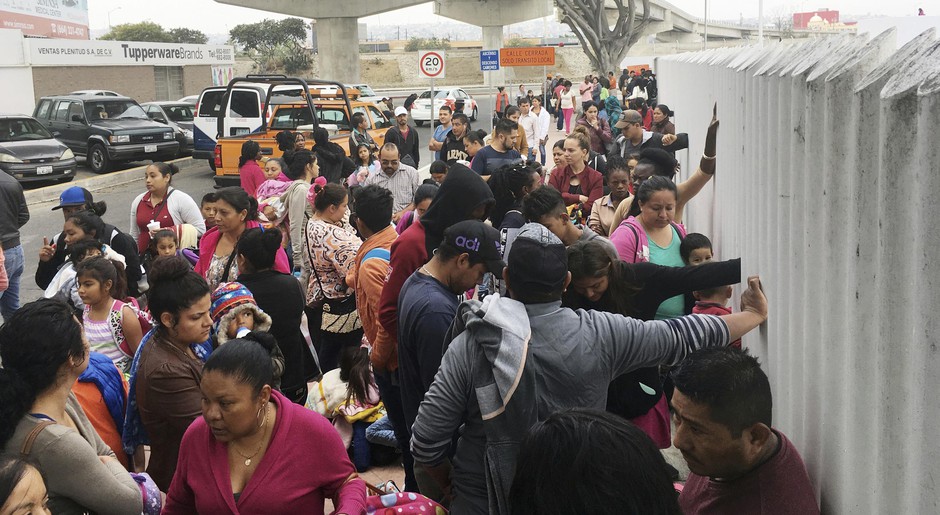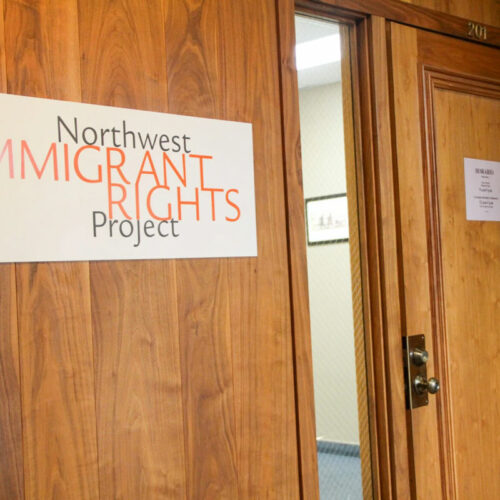
Parents Separated From Children At U.S.-Mexico Border Headed To Northwest Prisons
Some of the parents separated from their children while seeking asylum at the U.S.-Mexico border will end up in federal prisons in Oregon and Washington.
U.S. Immigration and Customs Enforcement officials confirmed this week that the agency is transferring 1,600 immigration detainees awaiting deportation hearings to federal prisons in Oregon, Washington and three other states.
ICE has contracted space for 130 beds at the federal prison in Sheridan, Oregon, and 209 beds at the federal detention center in SeaTac, Washington.
Immigration advocates say women at the federal facility near Seattle were separated from their children after they crossed the border and were arrested by officers with U.S. Customs and Border Patrol. The women were seeking asylum, advocates say.
“The tragedy that is the Trump Administration’s policy of separating children from their parents is now taking place in our state,” Jorge Baron, executive director of the Seattle-based Northwest Immigrant Rights Project, said in a statement.
Last month, officials with the U.S. Department of Justice and the Department of Homeland Security — which includes ICE — announced that they would work together to prosecute anyone entering the country illegally.
“I have put in place a ‘zero tolerance’ policy for illegal entry on our southwest border,” U.S. Attorney General Jeff Sessions said during a speech in San Diego on May 7. “If you cross this border unlawfully, then we will prosecute you. It’s that simple.”
On Thursday, ICE officials said in a statement that it was only responding to a “surge in illegal boarder crossings” and the federal government’s new policy.
“ICE is working to meet the demand for additional immigration detention space, both long and short term,” Danielle Bennett, an ICE spokesperson, said in a written statement. “To meet the immediate need, ICE has entered into inter-agency agreements with [the Bureau of Prisons] to acquire access to more than 1,600 additional beds at BOP facilities.”
In addition to the facilities in the Pacific Northwest, ICE has contracted 1,000 beds in California and more than 200 beds at a prison in Texas, near the U.S.-Mexico border.
The Northwest Immigrant Rights Project, a Seattle-based immigrant rights legal organization, said it first learned of the issue on Wednesday after representatives with the organization met with two women arrested by Border Patrol agents after crossing the U.S.-Mexico border with their daughters in mid-May.
Until this week, the women were being held at a detention facility in Texas. In a statement, NWIRP said the women were seeking asylum and feared returning to their home countries.
“Both were separated from their children shortly after they were apprehended by Border Patrol,” according to NWIRP’s statement.
The women were charged with illegal entry, a misdemeanor, and sentenced to time served, the group’s statement said.
“Instead of being returned to their children, who are now held at different government facilities, the two women were transferred to Washington while they proceed forward with the asylum process,” the nonprofit said.
The women told NWIPR that there were about 60 other women in a similar situation, but the group said it could be as many as twice that.
No details were immediately available late Thursday about how many — or if any — detainees had been transferred to the federal prison in Sheridan, less than 30 miles outside Salem.
ICE’s Bennett said the use of federal prisons is meant to be a temporary measure until the agency can arrange additional long-term contracts for new detention facilities or the surge in illegal border crossings drops.
“ICE continues to enforce immigration laws consistent with the Administration’s directives and the law,” Bennett said. “This includes ensuring sufficient detention space to hold aliens prior to removal or adjudication by an immigration judge.”
Copyright 2018 Oregon Public Broadcasting
Related Stories:

‘A humanitarian crisis’: Legal aid for unaccompanied minors slashed in Washington state
Northwest Immigrant Rights Project office in Wenatchee, Washington. (Credit: Reneé Dìaz / NWPB) Listen (Runtime 1:02) Read A federal judge in California ordered the Trump administration to temporarily restore legal

Immigration enforcement concerns cause mixed attendance trends in North Central WA schools
Eastmont Junior High School students make their way past the 800 wing on the way to their second period in East Wenatchee. (Credit: Jacob Ford / Wenatchee World) Listen (Runtime

These churches offer shelter and sanctuary to vulnerable migrants. Here’s why
Bishop Joseph Tyson (left) and the Rev. Jesús Mariscal (right) of the Yakima Diocese worry about how their parishioners will cope with broad changes to immigration policy, which have had















